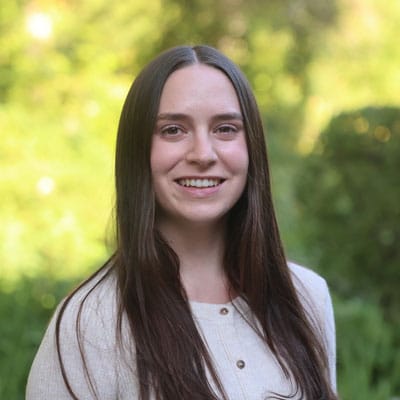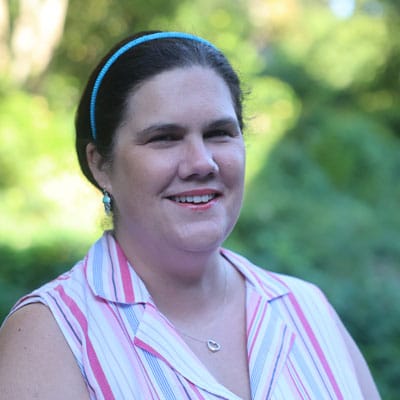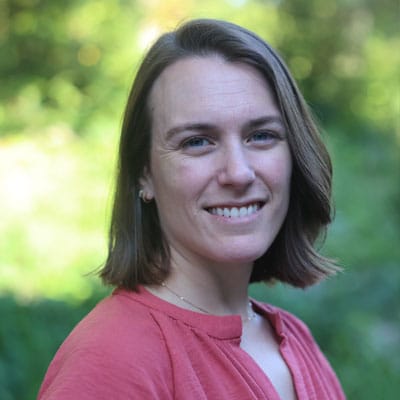Program
Full-day program.
Outdoor playtime occurs twice each day.
A full program of specialist classes is provided including Spanish, Art, Music, Library, STEM, and PE.
Access to the Beginning School playground as well as a campus pond and hiking trails provides plentiful outdoor opportunities.
Morning Drop-Off is from 7:45 - 8:10 a.m.
Afternoon Dismissal is at 3:00 p.m.
Healthy snacks are served each morning.
As part of the Kindergarten curriculum, students take a 45-minute weekly hike, year-round on one of Renbrook’s four hiking trails.
Students have regular STEM classes (Science, Technology, Engineering, and Math) where they engage in project-based designing and making.
Students learn about how they are unique in order to identify their similarities.
Our Theme-based program includes Nature at Renbrook, followed by student-driven themes such as Transportation, Toys, Underground, or The 4 Elements.
Kindergarten follows the Responsive Classroom methodology, an evidence-based approach to education that focuses on the strong relationship between academic success and social-emotional learning.
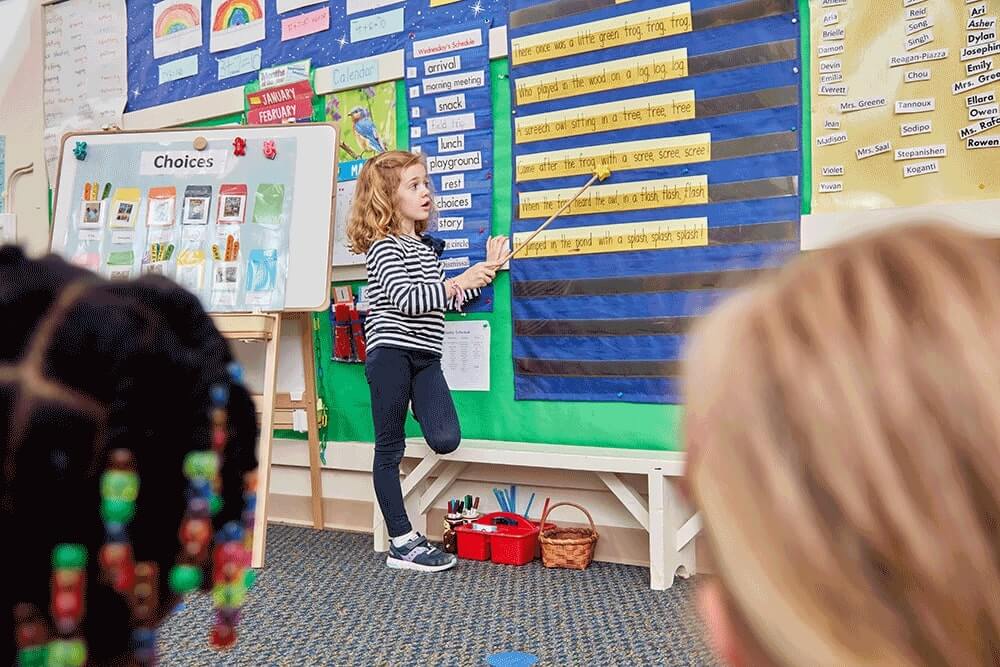
Benchmarks
Kindergarten (age 5 before Sept 1)
Kindergarten at Renbrook is a transition year between our play-based Preschool and Junior Kindergarten programs in the Beginning School and Grade 1 in the Lower School. In Kindergarten, our students spend time expanding their knowledge of phonics and reading, building their foundations in mathematics, developing their voice in writing, and engaging in hands-on, inquiry-based learning in science, social studies, and STEM. Students' language, social emotional, and cognitive skills are nurtured so that our students have the tools they need to continue to succeed as they get older. In addition, Renbrook’s Kindergarten students play, hike, enjoy relationships with buddy students in the Upper School, and participate in several special subject classes. Like all Renbrook students, they have opportunities to make their own choices in their learning, spend time outdoors, and flourish as young leaders as they learn who they are and what makes them special both as individuals and in classroom and school communities.
The Kindergarten benchmarks are intended to provide a framework for understanding the progression of a child’s development at Renbrook.
A Day in Kindergarten
Choice Time
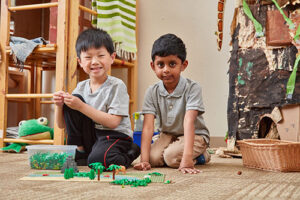 During this time, students engage in teacher-curated learning centers, build with different materials, engage in the science center, and look at books strengthening fine motor skills, letter recognition, and vocabulary.
During this time, students engage in teacher-curated learning centers, build with different materials, engage in the science center, and look at books strengthening fine motor skills, letter recognition, and vocabulary.
Morning Meeting
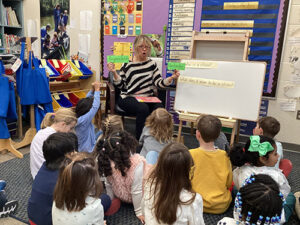 Kindergarten follows the Responsive Classroom methodology, an evidence-based approach to education that focuses on the strong relationship between academic success and social-emotional learning.
Kindergarten follows the Responsive Classroom methodology, an evidence-based approach to education that focuses on the strong relationship between academic success and social-emotional learning.
Fundations
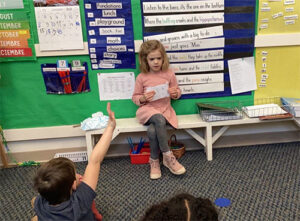 Students take part in a daily phonics lesson, learning to associate letters and diagraphs with key words and sounds.
Students take part in a daily phonics lesson, learning to associate letters and diagraphs with key words and sounds.
Specials Class
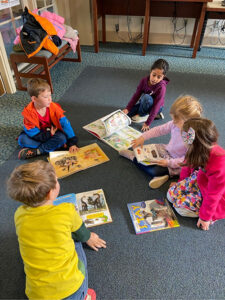
Library, Physical Education, Spanish, and Music
Snack
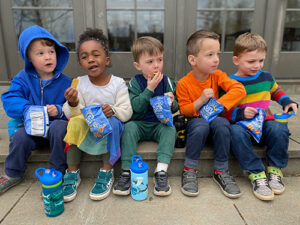 Students serve themselves from a choice of fresh fruit or a nut-free snack.
Students serve themselves from a choice of fresh fruit or a nut-free snack.
Writing
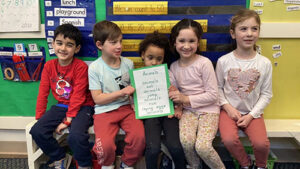 Students journal each week, where they learn writing conventions and move through the writing process of drafting, revising, editing, publishing, and "author shares." Students are exposed to a range of writing genres, including fiction, non-fiction, and poetry.
Students journal each week, where they learn writing conventions and move through the writing process of drafting, revising, editing, publishing, and "author shares." Students are exposed to a range of writing genres, including fiction, non-fiction, and poetry.
Mathematics
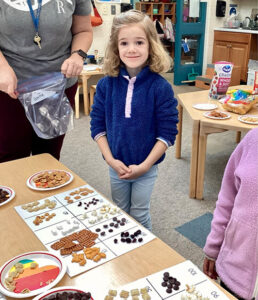 We use the Singapore Math Method where mastery is achieved through intentional sequencing of concepts using the CPA (Concrete, Pictorial, Abstract) progression, number bonds, bar modeling, and mental math. Students learn to think mathematically and rely on the depth of knowledge gained in previous lessons.
We use the Singapore Math Method where mastery is achieved through intentional sequencing of concepts using the CPA (Concrete, Pictorial, Abstract) progression, number bonds, bar modeling, and mental math. Students learn to think mathematically and rely on the depth of knowledge gained in previous lessons.
Outdoor Play
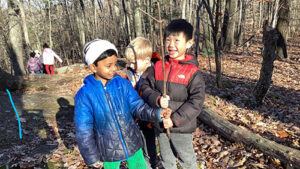 This is an essential time where students strengthen gross motor skills, design and initiate games, and negotiate peer interaction with teacher guidance.
This is an essential time where students strengthen gross motor skills, design and initiate games, and negotiate peer interaction with teacher guidance.
Lunch
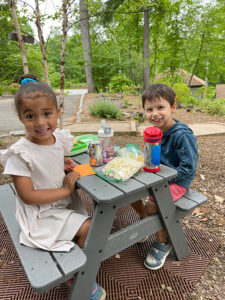 Students bring their own lunch, practice good manners, clean up after themselves, and engage in conversation with peers.
Students bring their own lunch, practice good manners, clean up after themselves, and engage in conversation with peers.
Rest
Students have quiet time for 45 minutes during which they can rest, read, catch up on work, or work with a teacher.
Story
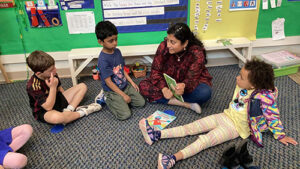 Teachers read a book to the class related to the theme, holidays their classmates celebrate or a relevant social topic. Family member "Mystery Readers" also visit class regularly.
Teachers read a book to the class related to the theme, holidays their classmates celebrate or a relevant social topic. Family member "Mystery Readers" also visit class regularly.
Theme-Related Activity
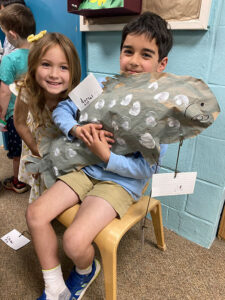
Examples include Where in the World Do I Live?, Upstanders/Bystanders, and two student-chosen themes such as The Arts, Animals at Renbrook, or Transportation.
Dismissal
Students wait with their teachers outside while caregivers drive through the car loop and teachers place students into their cars. Many children continue their day at After Care.

